Our Favorite Gear to Carry Up A Mountain (So Far)
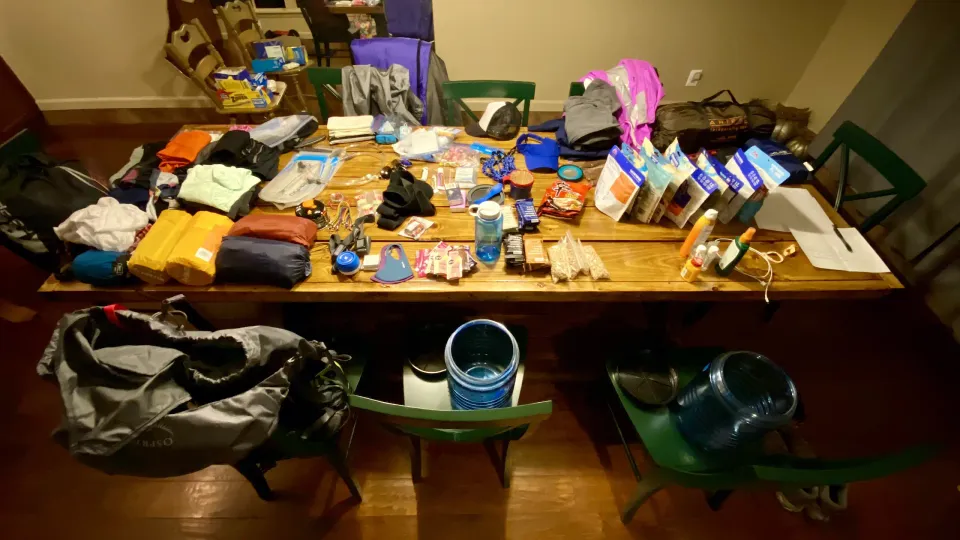
The Internet is full of "Best Of" sites for every niche of activity[1]. I'm not going to pretend we can tell you what's best for you. But I can tell you things we've used and liked, and that's exactly what I'm going to do.
Everything in this post went on our trip into Colorado's San Juan Mountains.
For backpacking, we've appreciated Clever Hiker and Erik the Black's Backpacking Blog. We'd love to hear your suggestions, though. ↩︎
Hiking Gear
Overall: My first new hiking backpack in 20 years, and I love it. (Meera's is the women's equivalent, the Osprey Aura AG 65.)
Pros: Profoundly comfortable for a 65L backpack; keeps my back mostly cool; comes with a removable top compartment for when you can take less stuff.
Cons: Doesn't come with a raincover; hip belt pockets are hard to zip closed one-handed; hip belts curl in rather than out, making "putting it on" more like "getting in."
Overall: Rugged hydropak hasn't let us down yet, despite quite a lot of abuse. Not great for freezing temperatures.
Pros: Leak-proof so far; bitevalve works well; comes with a magnetic doohickey to attach to your backpack strap for convenience.
Cons: Like every hydropak, ridiculously hard to clean. Get a cleaning kit (or a much-cheaper generic one, which is what we have. Osprey's aftermarket insulation is basically impossible to install, making this pack useless for skiing.
Camping Gear
Alps Mountaineering Aries 3 Camping Tent
Overall: Great two-person tent that's a little too heavy for backpacking. (Most two-person tents only sleep two people who like sleeping on top of each other. If you want any space for your gear, get a three-person tent.)
Pros: Very tall for a small tent. Vestibules completely cover giant backpacks and boots; extremely quick to pitch (after you practice once or twice). Buckles for the matching footprint and rain fly are simple and quick to attach and detach.
Cons: Seven pounds is a bit heavy for backpacking. We always put on the rain fly and never remember to leave the mesh open for stargazing. The tent is almost symmetrical, but not quite, which is annoying. (Pro-tip: the colored straps match the colored straps, and the black straps match the black straps. We've pitched this tent half a dozen times, and we just discovered the color trick on this trip.)
Overall: Massive upgrade from a foam bedroll; the only inflatable pad I've ever used, but it's plenty comfortable for me.
Pros: I didn't know you could be this comfy sleeping on the ground; lightweight (19.6 oz); surprisingly easy to deflate.
Cons: Takes a lot of breaths to inflate fully (they say 10–15, but that doesn't get me all the padding I want). The cover to the air valve is hard to snap on without deflating it a little.
Overall: The best headlamp I've ever used, not that I've tried a ton.
Pros: Has ultra-bright and red-light settings to preserve your night vision and adjustable angle to prevent blinding your camping companions.
Cons: There's only one button, so remembering how to change the light settings is a bit tricky, even though we've had these for almost two years.
Overall: Tent stakes go in, tent stakes come out; what more do you want?
Pros: Extremely lightweight (7 oz) and cheap ($8) for a 16-inch mallet; tapered handle end to pull stakes out of the ground.
Cons: I wish the tapered handle were a hook instead, to make pulling stakes just a fraction easier when you've hammered them too far into the ground.
Overall: Massive capacity for charging all the stuff you shouldn't have brought with you in the first place. Ideal for travel, fine but heavy for backpacking.
Pros: Charges multiple phones multiple times on a single charge; charges from USB-C or Micro USB, reducing the number of cables you have to carry.
Cons: Can only charge other devices via USB-A, not USB-C or Micro USB. Weighs 350g (12.32 oz).
Overall: You need a trowel; why not get one that weighs less than 28g and comes in seven colors? (I know I keep mentioning colors, but so much TACTICAL gear is all black and gray and camo that I love having an orange tent and a red shovel and a blue lantern. Now if only I'd known my backpack came in other colors before I bought it...)
Pros: Extremely strong, durable, and easily cleanable.
Cons: The whole concept of a camp shovel; not the most comfortable in the hand.
Overall: Cute, tiny, lightweight, bright lantern.
Pros: Easily lights up our entire tent; hanging loop collapses into body; fits anywhere in your backpack; comes in six different colors. (Colors!)
Cons: Basically none.
Overall: Not luxurious, but plenty comfortable. Stuff sack reverses into washable pillowcase.
Pros: Seriously, the stuff sack becomes a washable pillow case.
Cons: Not actually self-inflating if you like a firm pillow. Kind of expensive.
Sea to Summit Travel Liners (Silk; Polyester/Coolmax)
Overall: We have one silk and one polyester, and they both provide comfortable, warm, lightweight barriers between our gross post-hiking bodies and our sleeping bags.
Pros: Very lightweight, especially the silk (4.6 oz; the polyester is 8.7 oz); nicer on skin than the inside of a sleeping bag; washable.
Cons: If you toss and turn in your sleep, you can get twisted up; the polyester doesn't compress nearly as well as the silk; silk is very expensive.
Clothing
Overall: We own several weights and lengths of Darn Tough socks, and they're the best we've found for hiking, backpacking, and every day; I've replaced almost every sock I own with something from Darn Tough.
Pros: Lots of weights and sizes to choose from.
Cons: Lots of weights and sizes to choose from.
Overall: Meera's height (she's shorter than average) makes finding comfortable pants that fit well challenging; these pants fit perfectly and are tough enough and lightweight enough to survive both daily commutes and long hikes for years.
Pros: Good fit, lots of pockets, slightly stretchy, super tough.
Cons: Comes in lots and lots of colors, but because they're so popular, often the only good one available is "coal" (which really is a very nice gray).
Food & Food Gear
Overall: Definitely not ultralight, but works well and connects to both Osprey and Camelbak hydropaks.
Pros: Intake floater doesn't require deep water; pump fills 3L reservoirs quickly enough that I didn't notice how long it took; comes with universal hydropak connector and adapter for Nalgene water bottles.
Cons: weighs 11 oz (the Sawyer Mini Filter, an inline option, weighs 2 oz); relatively big compared to ultralight filters.
Overall: A ridiculous luxury for backpacking that I absolutely loved having with us.
Pros: Collapses to about half an inch thick; weighs 2.9 oz; makes pourover coffee anywhere.
Cons: Mesh filter is hard to get back in if it pops out (protip: remove the steel mesh and use paper filters); collapsible, but not flexible; your companions might tease you mercilessly for wanting pourover coffee miles away from nowhere.
Overall: Easy to pack, easy to use, easy to clean.
Pros: Collapses to half an inch thick; silicone was easy to clean, even oatmeal and freeze-dried pad thai.
Cons: Collapsible, but not flexible, so stacking two bowls and two cups took a surprising amount of room in my pack.
Overall: Surprisingly good at boosting energy during a hard hike; weird texture; not always delicious.
Pros: Very small single-serve packs, mostly with caffeine; makes hard workouts and hikes distinctly easier, especially the recovery period.
Cons: Some flavors are pretty bad (but there are lots to choose from). Texture takes some getting used to.
Overall: High-protein, high-calorie bars made of real food that don't taste like cardboard.
Pros: Most flavors taste pretty good, which is shocking for a protein bar. Easy to pack in hip belt for trailside snacking. Appear to be made of real food.
Cons: They're still protein bars, so they're not precisely delicious, and they're still quite heavy in the stomach, so be prepared with some water. You might feel way too hipster. Not cheap.
Miscellaneous
Lots and lots of Zip-Loc Bags
Overall: You're never going to know when you'll need a ziplock bag for partitioning food, sealing in trash or toilet paper to pack out, or keeping things waterproof in a pinch.
Pros: They don't weigh anything, so you can bring a bunch without burden; they also stuff into any available space.
Cons: None so far.

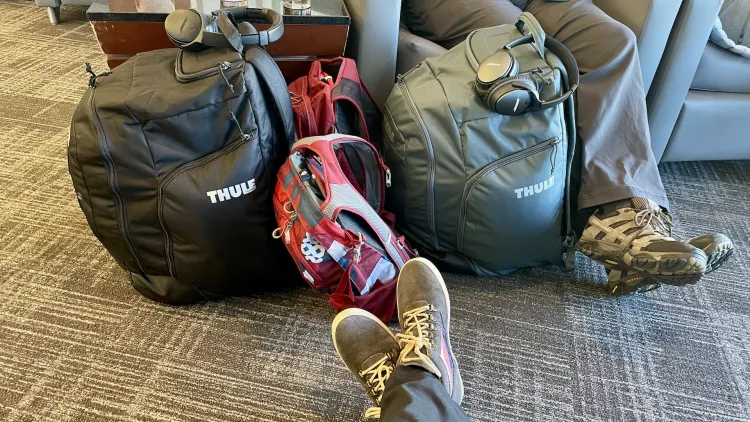
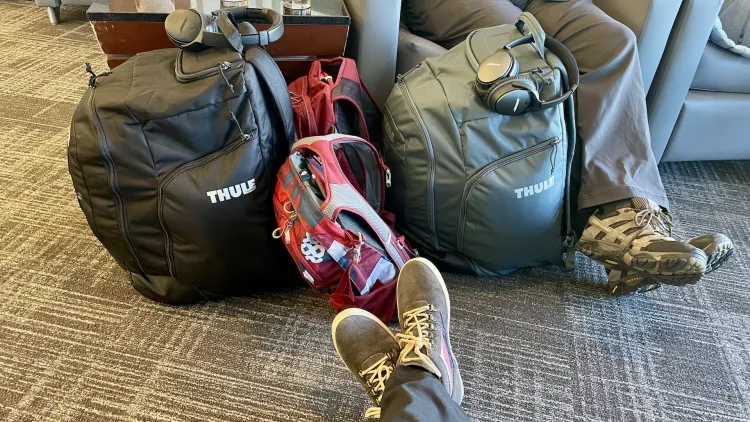
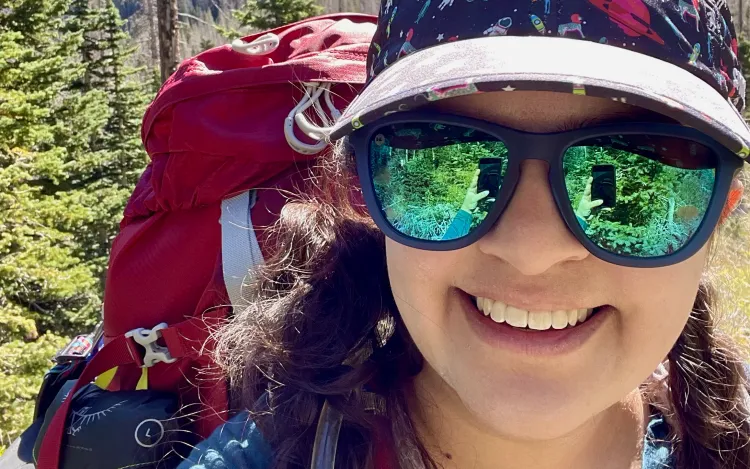
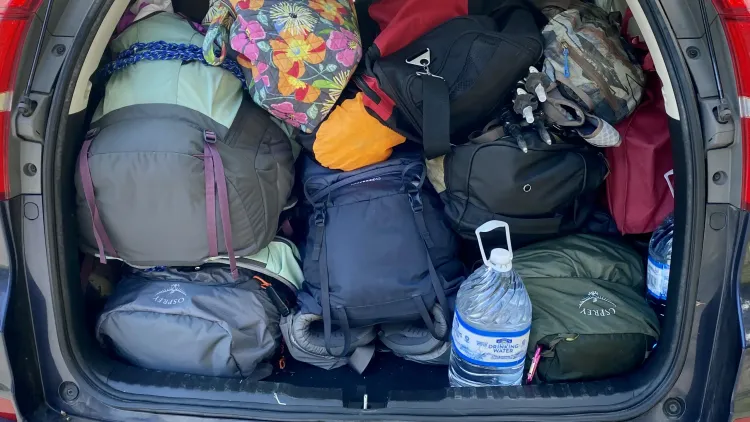
Member discussion